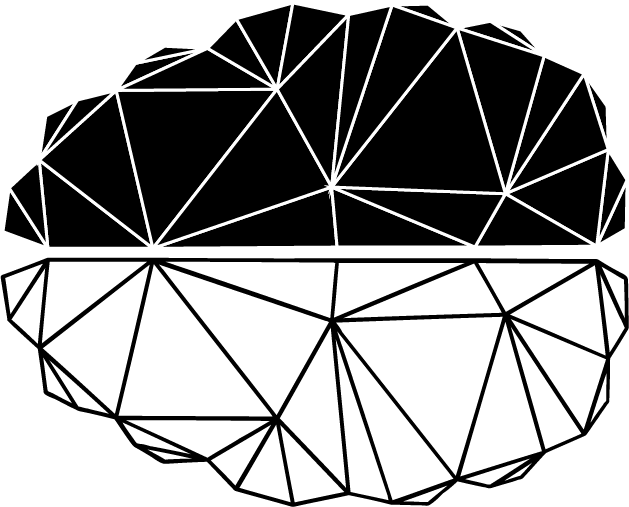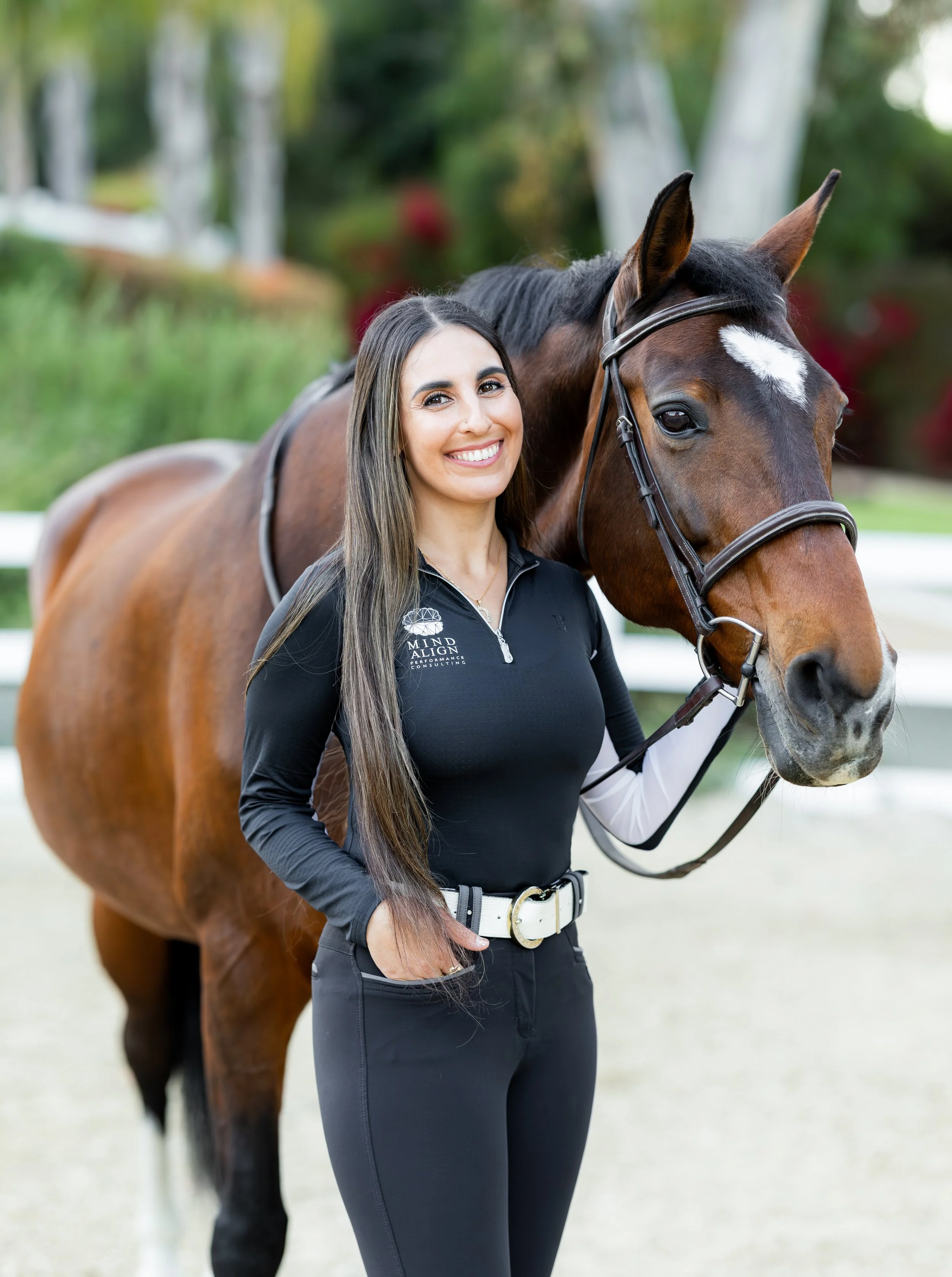Julia Agahee
As an athlete, I have been riding hunter/jumper style for over 20 years. When I was the ripe age of 18, I participated in Julie Winkel's Horse Industry Program for a full year in hopes of becoming a professional in the equine industry. After a year passed and many lessons were learned both on and off of horses, I realized that I had a different calling in the equestrian field.
I received my Bachelor of Arts Degree in Psychology from California State University, Fullerton in 2019. I then found a way to combine my love of horseback riding with my psychology background and received my Master of Science Degree in Kinesiology with an emphasis in Sport and Performance Psychology at CSUF. I am currently continuing my education through the certification process within the Association for Applied Sport Psychology, so that I can become the best mental performance practitioner I can be and best unlock the mental successes of both my current and future clients.
Over the years, I've struggled with my own performance issues related to the mental game, and I empathize with the pressures that are endured to produce consistent and outstanding results. I am living, breathing proof that the implementation of mental skills truly works. I am committed to helping others experience that same revelation and transform into the best athlete and person they can be. Besides horses, there is nothing more that I love than helping riders achieve all of their mental performance goals, reach their optimal riding potential, and truly thrive both in and out of the saddle.
Location
julia@mindalignperformance.com
Rancho Palos Verdes, CA
Not local? No problem, we can still meet virtually over Zoom or phone call!
Key Client Success Stories
For the purposes of client confidentiality, names have been changed for anonymity.
-
Amy is a competitive hunter/jumper rider who recently graduated from high school. She came to me during her junior year of high school with an unmanageable amount of nerves both at home and at shows, a high level of perfectionism, and a fear of missing the distances to the jumps due to past, negative experiences with her previous trainer and current horse. As a result, Amy would pull her horse off the approach to the jumps in an attempt to circle back to a better distance and not be able to complete courses at horse shows.
We started by not only diving into the root of her fears and anxieties, but we also determined how exactly the anxiety manifested in both her mind and body. We then did slow, intentional work to undo her perfectionistic mindset and welcome mistakes, implement strategies to create a relevant focus and calm body, and transformed her negative thoughts with helpful self-talk. Amy welcomes each mental tool and strategy and very much leaned into the skills that resonated with her the most, such as her physical release that she could use on course and her pre-course routine that was adapted for both lessons and horse shows.
Over time, repetition, and with a lot of resilience, Amy transformed into a confident rider who could successfully manage her nerves, effectively talk herself through situations, and easily let go of and learn from mistakes. She was able to successfully transfer these skills from one horse to another, increasing her adaptability and mental strength through all the new experiences and unknowns.
Amy has come such a long way, and we still meet periodically on an as-needed basis to both strengthen and build her repertoire of mental skills as she continues to show and transition into the next phase of her life.
-
Ricky is a middle-aged competitive and avid team roper who has big goals of winning the finals in Vegas. Ryan came to me with a lack of confidence in his roping skills and overall technique, an immense focus on the outcome of roping competitions, and an inability to let go of mistakes, especially at competitions. He went into competitions blindly, having no real strategy or plan to work off, and became frustrated with very inconsistent results.
We started with diving into his roping technique from the moment he entered the box to the moment he would exit the arena. We then developed a solid plan that he could work from no matter the horse he was riding, cows he was chasing, heeler he was assigned, competition he was at, or environment he was in. No matter what, the core principles of roping stayed the same. Ryan learned to focus on the factors that are in his control, remain in the present moment, and regulate as needed.
We took his plan and not only applied it during physical practice, but also reinforced it through guided imagery in the form of recorded scripts that we created together. We figured out the mental skills that work best for him and adapted a daily outline for him to follow, featuring both pre-ride and pre-run routines that mentally set him up for success, whether he was competing or practicing on his own.
Ryan still works with me to this day, and he gets better and better with every session and mental skill progression.
-
Sarah is a competitive hunter/jumper rider and working student in her 20s who attends horse shows on a regular basis. Sarah was very relaxed at home but would tense up and become anxious at horse shows, whether she was riding a client’s horse or her own, long-term horse. Although Sarah is a very experienced rider, she struggled with her confidence at horse shows and would often question her abilities and determine her worth based on the ribbons she would receive at horse shows. Although she knew that she had all the skills in place, the “what ifs” took over in her brain.
We met weekly for about 5 months and dove into many strategies that assisted with her nerves, focus, and self-talk. We grew her confidence by providing evidence of past success, sound solutions to her worries, and ultimately redefined her personal definition of what a successful ride entails. We were able to release tension in her body that builds up right before her round, come up with a mantra to empower her as needed, and introduce specific strategies that would help refocus her both in the present moment and on the current task at hand.
She developed the ability to transform her negative thoughts into helpful thoughts, support her optimal energy level for riding, and be proud of both herself and her horse no matter what ribbon she received. She now can pick out the parts of the course that she rode well, rather than solely fixating on the parts that she didn’t ride at her best. Sarah has been able to find the joy in competing at horse shows, viewing herself as her biggest competitor and working hard to level up her riding skills with each ride.
As she intentionally places her mind and hones in both her mental and physical techniques, she continues to thrive both in and out of the show ring.
Frequently Asked Questions
-
Mental performance training is the development and utilization of mental skills in an effort to increase one’s performance. We tackle different mental challenges and work towards the unique performance goals of each, individual athlete and performer. In very simple terms, your coach teaches you how to play the sport, while I teach you how to effectively think during the sport so that you can perform at your best every time.
-
Mental skills not only improve your sports performance, but are also directly transferable to daily life. You’ll find yourself more mentally prepared and equipped to effectively handle whatever life may throw at you. The implementation of mental skills also assists you in becoming a better person by becoming more self-aware, in control, and in tune with each situation that arises. Besides daily life, the best athletes in the world possess the physical skills along with a much stronger mental game than the average athlete.
-
Of course not, mental performance training is for everyone! It is most commonly used by competitive athletes and performers, but it is beneficial for all activities and areas of performance. Some examples of populations who seek mental performance training include the US Army, police officers, firefighters, and businesses. Even if you are an athlete who doesn't compete, mental performance training can benefit your recreational performance just as well as it would for competitive athletes.
-
Not at all! If you were gifted with natural mental skills without instruction, you can still benefit from professional mental training. Although you are doing well, everyone struggles and hits roadblocks. Despite the struggles, allow mental performance training to take your performance from good to great. Mental performance training will help the successful athlete reach new heights and achieve even more that was thought to be in their repertoire of skills.
-
The mind is complicated and the possibilities are endless! A few examples include managing nerves, confidence development, decision-making, pre-performance preparation, focus, energy management, and SO much more. Remember that the utilization of mental skills is unique to each performer and depends on many factors. Please reach out with any questions, or receive a personalized athlete identity diagnosis by filling out and submitting this form.
-
Start by filling out your Discovery Form. Julia will then follow up with you via your preferred choice of email, phone call, Zoom call, or text message. After choosing the best package for you, our very first session includes a longer, in-depth analysis about your performance, goals, and a plan to develop and improve certain mental skills that will help you achieve your personal mental performance goals. Following sessions aim to work towards that plan by directly implementing the mental skills and include in-person, Zoom, and phone call. Mental Performance Training Packages are highly encouraged to promote consistency of mental skills acquisition and utilization for long term change!
Don’t see your question?
Please reach out and ask!





